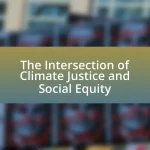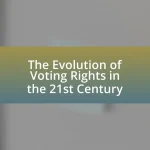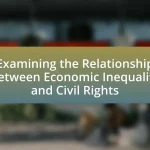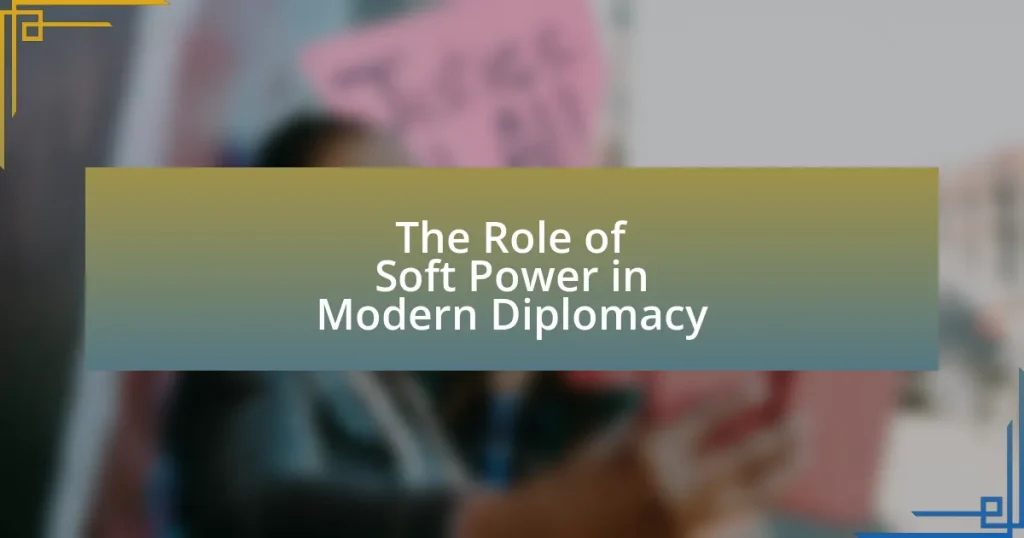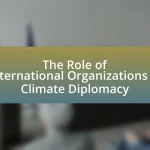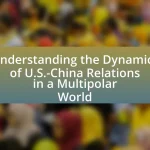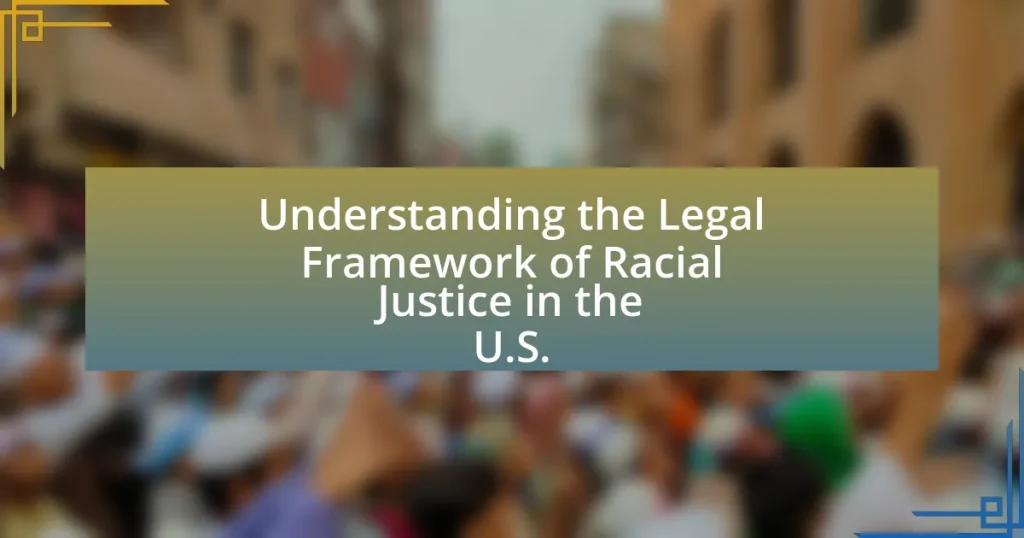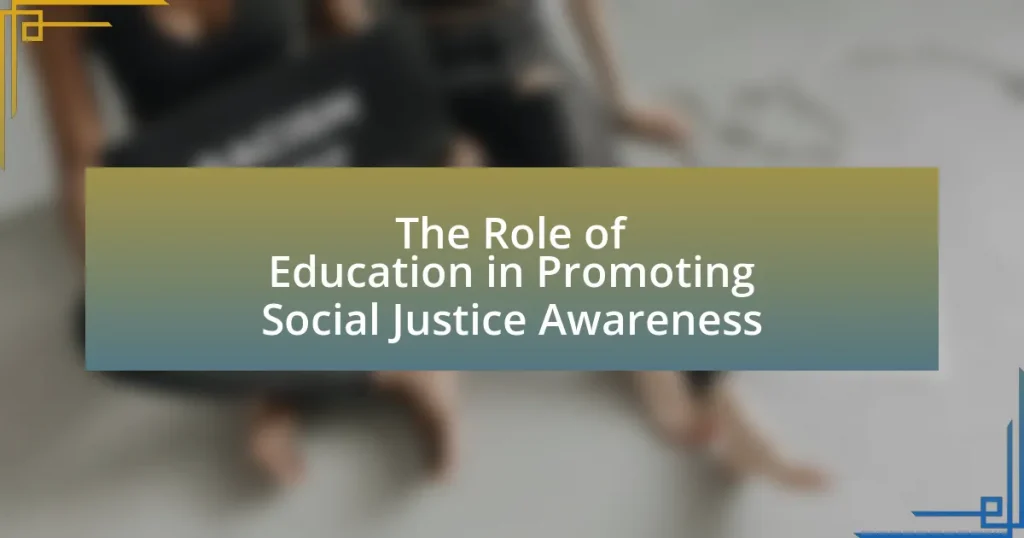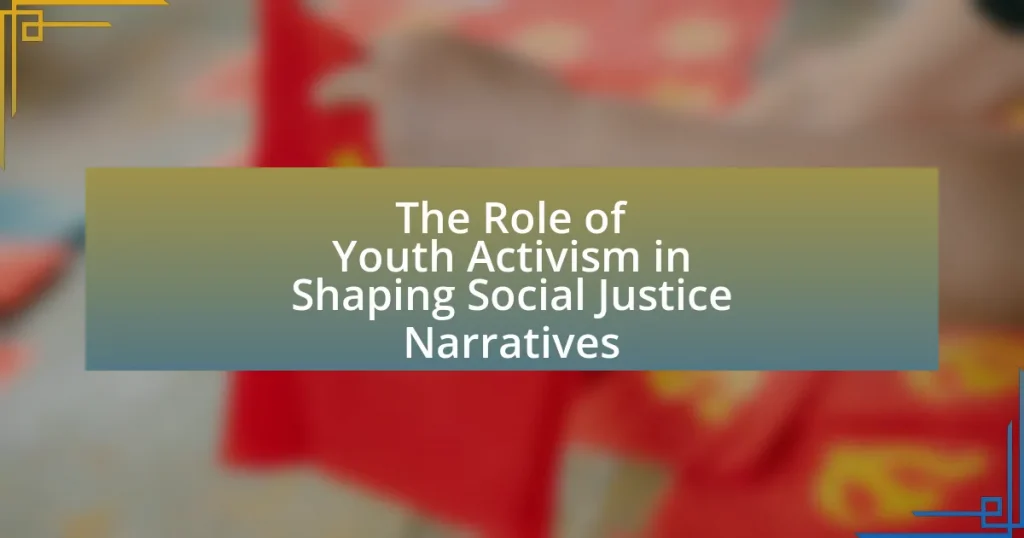The article examines the role of soft power in modern diplomacy, highlighting its significance in influencing international relations through attraction and persuasion rather than coercion. It defines soft power, identifies its key components—culture, political values, and foreign policies—and contrasts it with hard power. The discussion includes the importance of soft power in fostering cooperation, enhancing cultural exchange, and building favorable perceptions, as well as its impact on global influence and conflict resolution. Additionally, the article explores strategies for enhancing soft power, the challenges it faces in the current geopolitical landscape, and future trends influenced by technology and climate change.
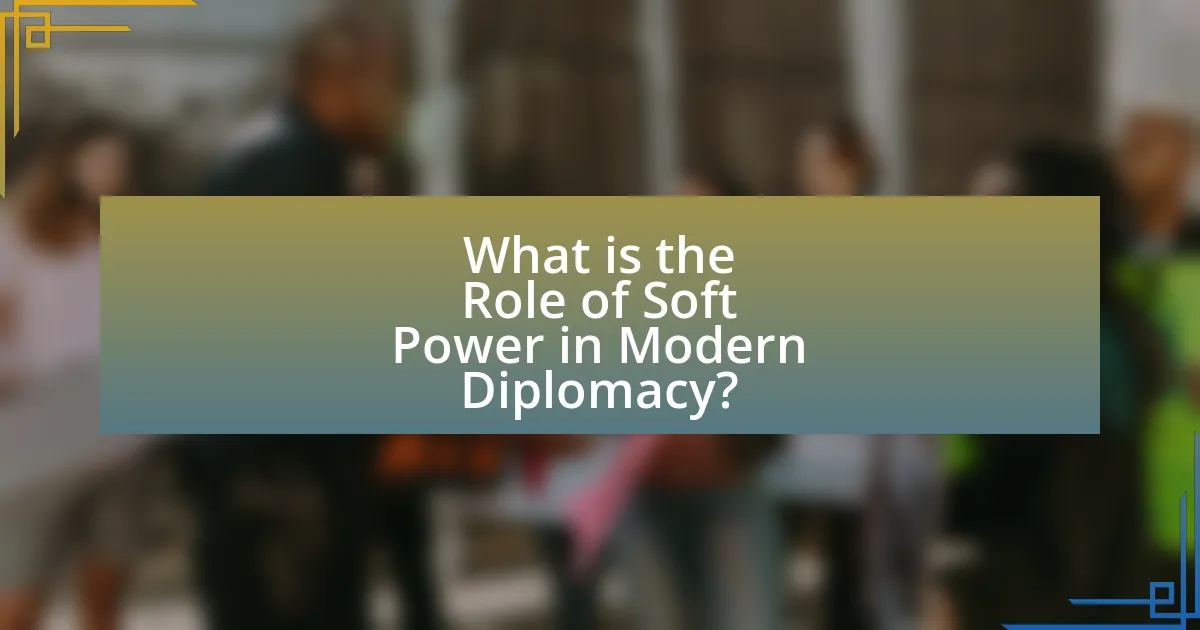
What is the Role of Soft Power in Modern Diplomacy?
Soft power plays a crucial role in modern diplomacy by enabling countries to influence others through attraction and persuasion rather than coercion. This approach fosters international cooperation, enhances cultural exchange, and builds favorable perceptions, which are essential for achieving diplomatic goals. For instance, the United States has utilized soft power through cultural exports like Hollywood films and educational programs, which have helped shape global attitudes and strengthen alliances. According to the 2021 Soft Power 30 Index, countries that effectively leverage soft power, such as Canada and New Zealand, often enjoy greater diplomatic influence and stability in international relations.
How is soft power defined in the context of diplomacy?
Soft power in the context of diplomacy is defined as the ability of a country to influence others through attraction and persuasion rather than coercion or force. This concept, introduced by Joseph Nye in the late 20th century, emphasizes the importance of cultural, ideological, and institutional appeal in international relations. For instance, countries that promote their values, culture, and political ideals effectively can enhance their global standing and foster cooperative relationships, as seen in the influence of American culture through media and education.
What are the key components of soft power?
The key components of soft power are culture, political values, and foreign policies. Culture encompasses the arts, education, and social norms that can influence other nations positively. Political values refer to the principles and ideals that a country promotes, such as democracy and human rights, which can enhance its attractiveness. Foreign policies that are perceived as legitimate and moral can also contribute to a nation’s soft power by fostering goodwill and cooperation. These components work together to shape a country’s ability to attract and co-opt rather than coerce, as outlined by Joseph Nye, who coined the term “soft power.”
How does soft power differ from hard power?
Soft power differs from hard power in that soft power relies on attraction and persuasion to influence others, while hard power uses coercion and force. Soft power is exemplified by cultural influence, diplomatic engagement, and economic partnerships, as seen in the global appeal of American culture and values. In contrast, hard power is demonstrated through military intervention and economic sanctions, such as the use of military force in conflicts like the Iraq War. This distinction highlights how nations can achieve their objectives through non-coercive means versus direct confrontation.
Why is soft power important in contemporary international relations?
Soft power is important in contemporary international relations because it enables countries to influence others through attraction and persuasion rather than coercion. This approach fosters diplomatic relationships, enhances cultural exchange, and builds global partnerships, which are essential in addressing transnational issues like climate change and terrorism. For instance, the United States has utilized soft power through cultural exports, such as Hollywood films and educational programs, to shape global perceptions and values, thereby reinforcing its influence on the world stage.
What impact does soft power have on global influence?
Soft power significantly enhances global influence by enabling countries to shape preferences and attract others through cultural appeal, political values, and foreign policies rather than coercion or payment. For instance, nations like the United States and Japan have effectively utilized soft power through cultural exports, such as movies, music, and technology, which foster positive perceptions and strengthen diplomatic ties. According to the Soft Power 30 Index, countries that leverage soft power effectively often enjoy greater diplomatic leverage and economic partnerships, demonstrating that soft power can lead to increased global influence and stability.
How does soft power contribute to conflict resolution?
Soft power contributes to conflict resolution by fostering cooperation and mutual understanding among conflicting parties. This approach relies on attraction and persuasion rather than coercion, enabling nations to build relationships based on shared values and cultural ties. For instance, diplomatic initiatives that emphasize dialogue and cultural exchange can reduce tensions, as seen in the post-apartheid reconciliation efforts in South Africa, where Nelson Mandela’s emphasis on forgiveness and unity helped to heal a divided nation. Such strategies demonstrate that soft power can effectively create an environment conducive to peaceful negotiations and conflict resolution.
What are the main strategies used in soft power diplomacy?
The main strategies used in soft power diplomacy include cultural exchange, international broadcasting, and educational programs. Cultural exchange fosters mutual understanding and goodwill through art, music, and festivals, exemplified by initiatives like the Fulbright Program, which promotes educational and cultural exchange between the U.S. and other countries. International broadcasting, such as the BBC World Service, disseminates information and cultural content to shape perceptions and influence foreign audiences. Educational programs, like scholarships and academic partnerships, enhance a country’s image and build long-term relationships, as seen in the global reach of institutions like the British Council. These strategies collectively enhance a nation’s influence without coercion, relying on attraction rather than force.
How do cultural exchanges enhance soft power?
Cultural exchanges enhance soft power by fostering mutual understanding and respect between nations. These exchanges, such as student exchange programs, art exhibitions, and cultural festivals, allow countries to share their values, traditions, and perspectives, which can lead to improved international relations. For example, the United States’ Fulbright Program has facilitated educational exchanges since 1946, promoting cross-cultural dialogue and enhancing America’s global image. This increased cultural diplomacy helps build trust and influence, making countries more appealing to others, thereby strengthening their soft power.
What role do international organizations play in soft power?
International organizations play a crucial role in soft power by facilitating cooperation, promoting shared values, and enhancing cultural exchange among nations. These organizations, such as the United Nations and the World Health Organization, leverage their platforms to influence global norms and foster diplomatic relationships, thereby increasing the appeal of member states. For instance, the United Nations promotes human rights and sustainable development, which enhances the soft power of countries that actively participate in these initiatives. Additionally, international organizations often serve as mediators in conflicts, helping to build trust and goodwill, which further strengthens the soft power of involved nations.
How does soft power interact with hard power in modern diplomacy?
Soft power interacts with hard power in modern diplomacy by complementing and enhancing the effectiveness of coercive measures. While hard power relies on military and economic force to achieve national objectives, soft power utilizes cultural influence, diplomacy, and values to shape preferences and foster cooperation. For instance, the United States has often paired military interventions with diplomatic efforts and cultural exchanges to build alliances and gain legitimacy, as seen in its post-World War II reconstruction efforts in Europe, which combined military presence with initiatives like the Marshall Plan. This synergy allows nations to achieve their goals more effectively by leveraging both coercive and persuasive strategies in international relations.
What challenges does soft power face in the current geopolitical landscape?
Soft power faces significant challenges in the current geopolitical landscape, primarily due to the rise of authoritarian regimes and the increasing polarization of global politics. Authoritarian governments, such as those in China and Russia, often counteract soft power initiatives by promoting their own narratives and values, which can undermine the influence of democratic nations. Additionally, the proliferation of misinformation and disinformation campaigns complicates the ability of countries to project their soft power effectively, as public perception can be easily manipulated. Furthermore, the growing importance of hard power, particularly military strength, in international relations diminishes the appeal of soft power strategies, making it difficult for nations to rely solely on cultural diplomacy and international cooperation to achieve their foreign policy goals.
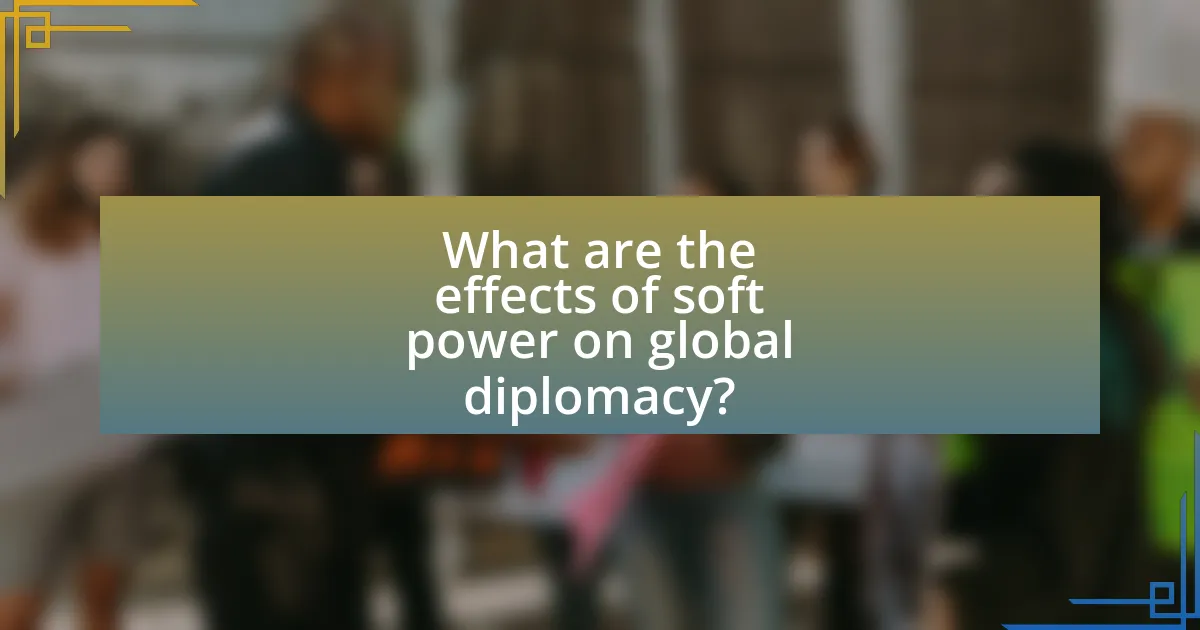
What are the effects of soft power on global diplomacy?
Soft power significantly influences global diplomacy by enhancing a country’s ability to shape international relations through attraction rather than coercion. This approach fosters cooperation, builds alliances, and promotes cultural exchange, which can lead to more stable and peaceful international environments. For instance, countries like Japan and Sweden have effectively utilized soft power through cultural diplomacy and humanitarian aid, resulting in improved global standing and influence. The 2021 Soft Power 30 Index ranked countries based on their soft power capabilities, highlighting how nations leverage cultural assets, political values, and foreign policies to enhance their diplomatic reach.
How does soft power influence public perception of nations?
Soft power significantly influences public perception of nations by shaping how they are viewed globally through cultural appeal, political values, and foreign policies. For instance, countries that effectively utilize soft power, such as through cultural exports like music, film, and education, can enhance their image and foster goodwill among foreign populations. The United States, for example, has historically leveraged Hollywood and its educational institutions to project a positive image, which has contributed to its global influence. According to a 2021 report by the Soft Power 30, nations that rank high in soft power tend to enjoy better diplomatic relations and increased economic opportunities, demonstrating the tangible benefits of a favorable public perception.
What role does media play in shaping soft power?
Media plays a crucial role in shaping soft power by influencing public perception and cultural narratives. Through various platforms, media disseminates information that can enhance a country’s image, promote its values, and foster international relationships. For instance, the global reach of media outlets like BBC and CNN allows countries to project their cultural and political ideals, thereby increasing their soft power. Research indicates that nations with strong media presence can significantly impact global opinion, as seen in the case of South Korea’s cultural exports, which have bolstered its soft power through the Korean Wave phenomenon. This demonstrates that effective media strategies can enhance a nation’s attractiveness and influence on the global stage.
How do social media platforms contribute to soft power dynamics?
Social media platforms contribute to soft power dynamics by enabling countries to project their cultural values and influence global public opinion. These platforms facilitate the dissemination of information and narratives that shape perceptions, allowing nations to enhance their image and foster relationships with foreign audiences. For instance, the U.S. State Department has utilized platforms like Twitter and Facebook to promote American values and policies, reaching millions worldwide and influencing international discourse. Additionally, research from the Pew Research Center indicates that social media significantly impacts how individuals perceive foreign cultures, with 72% of users reporting that social media helps them connect with people from different countries, thereby enhancing cultural exchange and soft power.
What are some successful examples of soft power in action?
Successful examples of soft power in action include the United States’ cultural influence through Hollywood, which has shaped global perceptions and values, and South Korea’s Korean Wave (Hallyu), which has popularized its music, television, and fashion worldwide. The United States leveraged its film industry to promote democratic ideals and lifestyle, evidenced by the global box office success of films like “Star Wars” and “The Avengers,” which have reached audiences in numerous countries. Similarly, South Korea’s K-pop and dramas, such as “Parasite,” which won the Academy Award for Best Picture in 2020, have significantly enhanced its cultural appeal and diplomatic relations, showcasing the effectiveness of soft power in fostering international goodwill and influence.
How has the United States utilized soft power historically?
The United States has historically utilized soft power through cultural diplomacy, international aid, and the promotion of democratic values. For instance, the establishment of the Fulbright Program in 1946 exemplifies cultural diplomacy by fostering educational exchanges that enhance mutual understanding. Additionally, the U.S. has provided significant foreign aid, such as the Marshall Plan post-World War II, which helped rebuild Europe and fostered goodwill towards America. Furthermore, the promotion of democratic ideals, particularly during the Cold War, positioned the U.S. as a global leader advocating for freedom and human rights, influencing nations to align with American values. These strategies collectively demonstrate the effective use of soft power by the United States throughout its history.
What lessons can be learned from the European Union’s soft power approach?
The European Union’s soft power approach demonstrates that effective diplomacy can be achieved through cultural influence, economic partnerships, and the promotion of shared values. This strategy has allowed the EU to enhance its global standing and foster cooperation with other nations. For instance, the EU’s emphasis on human rights and democratic governance has positioned it as a normative power, influencing countries to adopt similar standards. Additionally, the EU’s trade agreements often include provisions for environmental and labor standards, showcasing how economic ties can be leveraged to promote broader social goals. These elements illustrate that soft power can be a vital tool in modern diplomacy, enabling the EU to navigate complex international relations while fostering stability and collaboration.
How can nations effectively enhance their soft power?
Nations can effectively enhance their soft power by promoting cultural diplomacy, fostering international education exchanges, and leveraging media to shape positive narratives. Cultural diplomacy, such as art exhibitions and music festivals, allows nations to showcase their heritage and values, thereby increasing their appeal. For instance, the United States has utilized programs like the Fulbright Scholarship to facilitate educational exchanges, which have historically strengthened ties and improved perceptions abroad. Additionally, countries can utilize social media platforms to disseminate their cultural narratives and values, as seen with South Korea’s global influence through K-pop and cinema, which has significantly boosted its soft power. These strategies demonstrate that a combination of cultural engagement, educational initiatives, and effective communication can substantially enhance a nation’s soft power on the global stage.
What strategies can be implemented to improve cultural diplomacy?
To improve cultural diplomacy, nations can implement strategies such as fostering educational exchanges, promoting cultural events, and enhancing digital diplomacy initiatives. Educational exchanges, like the Fulbright Program, allow students and professionals to experience different cultures firsthand, thereby building mutual understanding and respect. Promoting cultural events, such as international film festivals or art exhibitions, can showcase a nation’s cultural heritage and values, facilitating dialogue and connection among diverse populations. Additionally, enhancing digital diplomacy through social media campaigns and virtual cultural experiences can reach wider audiences, allowing for real-time engagement and interaction. These strategies have been shown to strengthen international relationships and enhance a nation’s soft power, as evidenced by the increased global influence of countries that actively engage in cultural diplomacy.
How important is education in building soft power?
Education is crucial in building soft power as it fosters cultural exchange, enhances international relationships, and promotes mutual understanding. Countries that invest in education, such as through scholarships and academic partnerships, often gain influence and respect on the global stage. For instance, the United States has utilized its higher education system to attract international students, with over one million enrolled in 2020, thereby enhancing its soft power by creating a network of global leaders who have experienced American culture and values. This educational outreach not only strengthens diplomatic ties but also cultivates a favorable image, demonstrating the significant role education plays in the development of soft power.
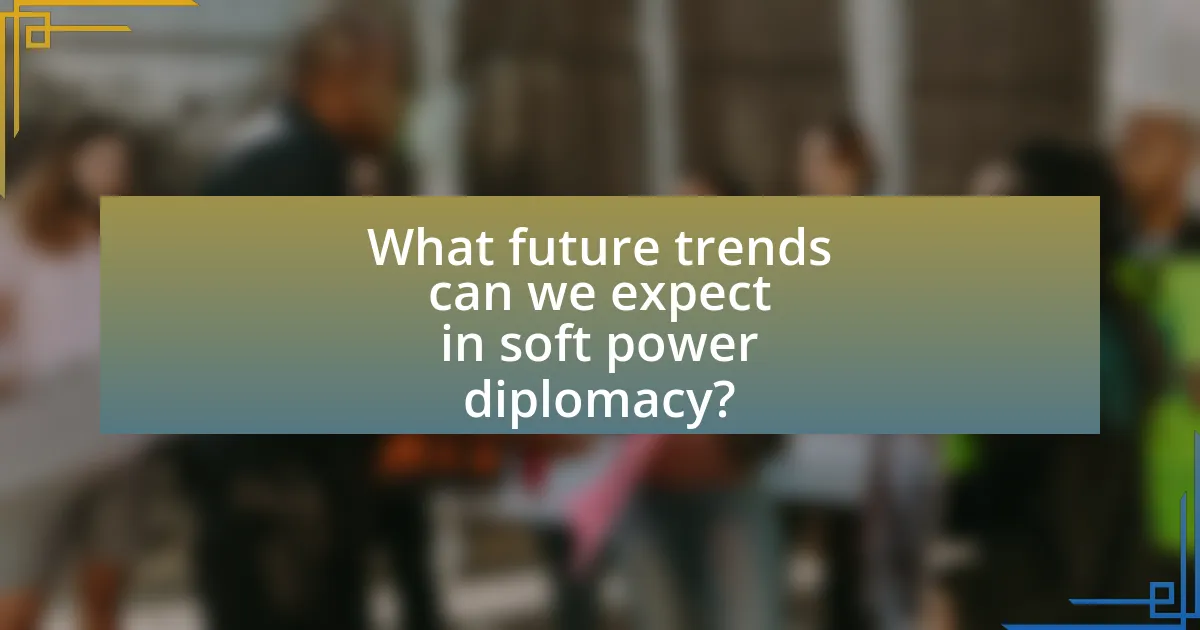
What future trends can we expect in soft power diplomacy?
Future trends in soft power diplomacy will increasingly focus on digital engagement and cultural exchange. As technology advances, nations will leverage social media and online platforms to enhance their global influence, allowing for real-time communication and interaction with foreign audiences. For instance, the rise of influencers and digital content creators will play a significant role in shaping perceptions and fostering connections across borders. Additionally, countries will prioritize educational initiatives and cultural programs to build long-term relationships, as seen in the growing popularity of international scholarships and cultural festivals. These trends reflect a shift towards more inclusive and participatory forms of diplomacy that resonate with younger generations and diverse populations.
How might technology shape the future of soft power?
Technology will significantly shape the future of soft power by enhancing communication, increasing access to information, and facilitating cultural exchange. The rise of social media platforms allows nations to project their values and culture globally, influencing public opinion and fostering international relationships. For instance, the use of platforms like Twitter and Instagram enables countries to engage directly with foreign audiences, bypassing traditional media filters. Additionally, advancements in digital diplomacy, such as virtual summits and online cultural events, create opportunities for nations to showcase their soft power initiatives effectively. Research by the Brookings Institution highlights that countries leveraging technology for soft power can enhance their global influence, as seen in the successful cultural diplomacy campaigns of South Korea through K-pop and cinema.
What emerging trends in global communication could impact soft power?
Emerging trends in global communication that could impact soft power include the rise of social media platforms, the increasing importance of digital diplomacy, and the proliferation of misinformation. Social media platforms like Twitter and Instagram enable countries to project their cultural values and narratives directly to global audiences, enhancing their soft power. For instance, the use of social media by governments during crises, such as the COVID-19 pandemic, has allowed them to shape public perception and foster international goodwill. Digital diplomacy, characterized by the use of online tools for diplomatic engagement, allows nations to connect with foreign publics more effectively, as seen in initiatives like virtual summits and online cultural exchanges. Additionally, the spread of misinformation can undermine a country’s soft power by distorting its image and eroding trust, as evidenced by the impact of fake news on international relations during electoral processes. These trends collectively reshape how nations wield soft power in an interconnected world.
How will climate change influence soft power strategies?
Climate change will significantly influence soft power strategies by compelling nations to prioritize environmental diplomacy and sustainability initiatives. As global awareness of climate issues rises, countries that lead in climate action and innovation will enhance their international reputation and influence. For instance, nations like Sweden and Denmark have successfully leveraged their commitment to renewable energy and climate policies to strengthen their soft power, as evidenced by their high rankings in global soft power indices. This shift towards climate-centric diplomacy will encourage collaboration on environmental issues, fostering alliances and enhancing a country’s global standing.
What practical steps can countries take to strengthen their soft power?
Countries can strengthen their soft power by investing in cultural diplomacy, enhancing educational exchanges, and promoting international cooperation. Cultural diplomacy, such as showcasing national art, music, and cuisine, fosters positive perceptions and builds relationships. For instance, the United States has utilized cultural programs like the Fulbright Program to facilitate educational exchanges, which have resulted in increased goodwill and understanding among nations. Additionally, countries can engage in international cooperation through initiatives like humanitarian aid and climate change agreements, which demonstrate commitment to global issues and enhance their global image. These practical steps are supported by research indicating that nations with strong cultural ties and educational partnerships tend to have greater influence in international relations.
How can nations assess their current soft power status?
Nations can assess their current soft power status by utilizing various metrics and indices that evaluate cultural influence, diplomatic relationships, and global perceptions. For instance, the Soft Power 30 index, published by the Portland Communications and the University of Southern California, ranks countries based on factors such as cultural exports, political values, and international engagement. Additionally, nations can conduct surveys to gauge global public opinion about their culture, values, and policies, which provides direct insight into their soft power effectiveness. These assessments are validated by the correlation between high soft power rankings and favorable international relations, as seen in countries like Canada and Sweden, which consistently score high in soft power metrics.
What best practices should be followed to enhance soft power initiatives?
To enhance soft power initiatives, countries should prioritize cultural diplomacy, educational exchanges, and international collaboration. Cultural diplomacy fosters mutual understanding and respect through the promotion of arts, traditions, and values, as evidenced by successful programs like the British Council and the Goethe-Institut, which have effectively increased their nations’ global influence. Educational exchanges, such as the Fulbright Program, create lasting relationships and goodwill, contributing to a positive national image. Additionally, international collaboration on global issues, such as climate change and public health, demonstrates a commitment to shared values and enhances a country’s reputation, as seen in the collaborative efforts of countries during the COVID-19 pandemic. These practices collectively strengthen a nation’s soft power by building trust and fostering positive relationships on the global stage.



